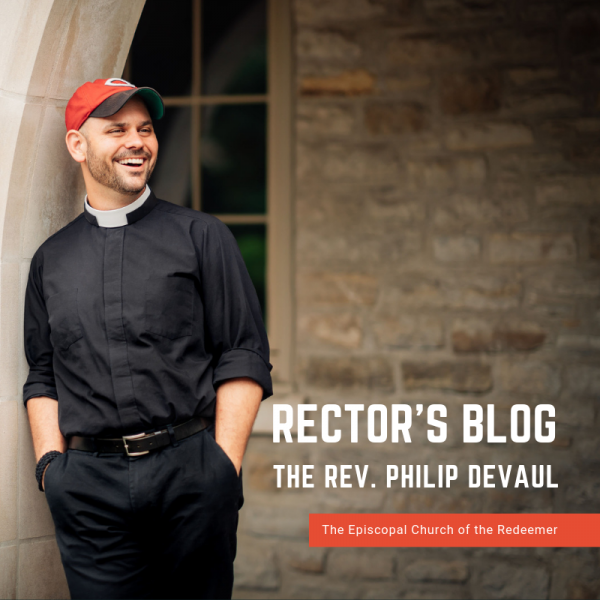Rector's Blog: Letting Go of Being Good

This Lent at Church of the Redeemer, we enter into our second year of involvement with an initiative called Becoming Beloved Community. Becoming Beloved Community is the Episcopal Church’s long-term commitment to racial healing, justice, and reconciliation. We believe the Holy Spirit has invited us to participate with God in this work, and we are praying for the courage to embody Jesus’ love with honesty, authenticity, and open hearts in this process.
This second year of Becoming Beloved Community will be devoted to the task of Telling the Truth About the Church and Race. This will be good work for us. It will also be difficult. See, Redeemer, like a lot of Episcopal churches, is predominantly white. So when we commit to telling the truth about our church and race, we have to ask difficult questions about why we’re so white in the first place, how we came to be this way, and why we’ve stayed this way so far. We don’t ask these questions to shame ourselves. Rather, we seek to understand our history more fully, so that we can work for a different future.
As we do this work, we’re going to learn a lot about systemic racism and white supremacy – and we’re going to learn how we as a church culture have benefited from and been complicit in these things. And, if I’m being honest, I get anxious about this. I get anxious because I was raised to believe that racism was about consciously disliking or pre-judging people who were a different race than me; and, further, I was taught that I shouldn’t be a racist like that. So as far as I was concerned, I wasn’t a racist. Racists were bad people.
In the last couple years year, though, I’ve begun to learn about systemic racism. I’ve been confronted with these questions: What if the culture in which I’ve grown up is racist, and I’ve benefited from that? What if the system that I’ve loved is laced with white supremacy and I’ve been complicit with this? Then am I a racist? Because racists are bad people. And I don’t want to be a bad person. And I know you don’t either. We want to be good people. And can we be good people if we benefit from or are complicit in the oppression and marginalization of other people?
The power of the Christian narrative in relation to racism – and particularly in relation to the white Christian’s confrontation of white supremacy – is the assumption that we are sinful. We are not flawless. We are not without blemish or fault. The Christian belief is that we are, in fact, incapable of moral purity. And in terms of embracing the truth of racism, this is tremendously helpful.
We are scared of being bad people, because this world conditions us to believe that bad people don’t deserve love. Meanwhile, God is too busy loving us to decide whether or not we deserve it.
But if we embrace the Christian narrative openly and honestly, we embrace the fact both of our imperfection and our belovedness. We rid ourselves of the false notion that we must be good in order to be loved, and we lean hard into the reality that God loves us right now. And then we get honest about how we sin. And in terms of racism and white supremacy, we learn about how a culture of sin can contaminate our hearts and distort our understanding of goodness and love. We learn about complicity and privilege within the context of sinful systems.
I know I’ve done things I shouldn’t have; I know I’ve benefited from the sins of others; I know my understanding of my own self-image is distorted. And I know I’ve been loved by God and I’ve belonged to God all the while. And, by the way, I’ve been loved and belonging to God all the while, not because God approves of my behavior or distorted self-understanding, but because of the magnitude of God’s grace, the sheer scope of the Divine Love.
If I let go of the lie that I need to deserve love, to achieve belonging to God, to earn my place in this world, I am liberated – freed to diagnose the sickness of my soul and participate in the process of healing and recovery.
Acknowledging my part in white supremacy does not promote shame: It dispels it, disintegrates shame from our conscience. Confronting our participation in racism and white supremacy is not about self-flagellation or indulging in being ashamed: It’s about naming the shame we’ve hidden in our bodies, minds, and hearts. It’s a step towards being freed of the shame we’ve always carried. This kind of loving, liberating, life-giving work is the work of Jesus Christ in this world and in our lives.
Throughout Lent, I hope to the best of my ability to tell the truth about our church and race. I hope you will join me in this work, and I hope you will see it as an expression of love for you, for Church of the Redeemer, and above all for Jesus Christ, whose love is the reason we exist.